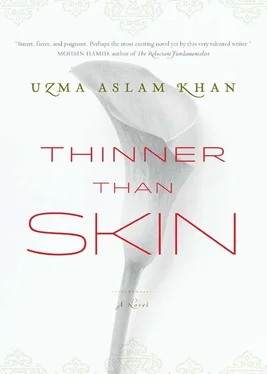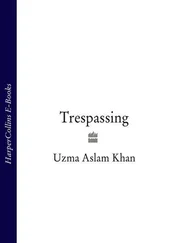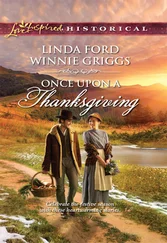And yet, despite the monotony of dread, something lived. Resilience can flower in the muck of death and despair, particularly when it doesn’t even know it. I saw this especially around my sister. Hers was an elasticity I didn’t think Farhana expected to see and I wasn’t sure she was glad to see it. It made her feel … irrelevant.
I compared them, my sister Sonia and Farhana. I knew Farhana did too. Had she expected to come from a position of — improvement? She was better educated. Wealthier. Sonia taught at a private school that paid 15,000 rupees per month. Farhana made more than two hundred times as much. When they shopped together, Sonia bargained for her as though for herself, and bought her gifts. Farhana never reciprocated. She would have been right in identifying herself in the position of receiver in a culture that took pride in its hospitality. But she didn’t really reveal any desire to give. Wes, on the other hand, frequently presented my mother with flowers and fruit, and I’ll admit I was surprised, surprised also that we were comparing at all, Farhana and I. Sonia to Farhana, Farhana to Wes. Why?
It didn’t stop. We kept matching them up. Sonia hadn’t enjoyed much freedom or affection from my father; Farhana received much from hers. And yet. Sonia had a comfortable, casual air about her that came from complete ease in an environment she claimed to envy me for leaving. Farhana was seldom as relaxed, not in San Francisco, certainly not here. Sonia laughed more than Farhana. She flirted with shopkeepers. She had a cabal of “best friends.” Her cell phone never stopped ringing. Her benign husband observed everything about her with a benign gaze, no matter how she was dressed. But dress did matter to Farhana.
She’d come equipped with two outfits, both once belonged to her mother, both with kurtas falling halfway down her shins, both in colors unbecoming. She was too pale for parrot green and mouse brown made her look, well, mousy. Besides, the starched cotton flared around her torso. She complained of looking pregnant, which she did, though I said the best lay underneath. She asked why I hadn’t told her about the latest fashions. I asked why she hadn’t searched the internet. To which she replied, tetchily, “I didn’t know your sister was so fashionable.” To which I didn’t know how to reply.
How much of this contributed to the quarrel we were about to have? I couldn’t say. Though by the third day she started deferring to Sonia’s taste, and started looking the better for it, Farhana’s feeling of insignificance was only to increase.
On that third day, we heard it on the news: A bomb exploded in a hotel this morning, killing one foreigner and seven Pakistanis . Wes wondered if instead of heading north for the mountains we should be heading west across the Atlantic.
“You’re not the target,” I said, and Farhana complained I wasn’t being sympathetic.
“Sympathetic? One foreigner dies and seven locals. Where’s his sympathy?” I didn’t say, Where’s yours ? We were again weighing lives against each other, one against seven, relevance against irrelevance. Instead of answering me she called out to Wes, and, while I watched, they both strode into the kitchen, where my mother was to lavish them with yet another ridiculously complicated meal.
The next two days, we spent apart. And unfortunately, the nights. We’d barely slept together in the weeks before leaving San Francisco, but since arriving in this city, where lust was a life-size secret, I wanted her again. Farhana was reserved. Why did I want her if I didn’t want to hold her hand? she asked, when I sneaked into her room. The question astonished me because, obviously, the answer was born of it. I wanted her because I couldn’t hold her hand. Or any other part. A quick fuck is a dead end, she said, forcing me back to my room.
Instead of focusing on events in the house, I focused on events in Waziristan, on the Afghan border, where lust was no secret at all. The local tribes of Waziristan harbored Arabs, Tajiks, Uzbeks, Chechens, and Chinese Uyghur Muslims. Some of them were fleeing the war in Afghanistan, but others were fleeing their own governments. Waziristan’s tribal chiefs welcomed everyone except Pakistanis from outside their own tribe. Call it hospitality. Irfan and I decided the entrance to Waziristan should have a statue holding a Kalashnikov and a Quran. Give me your tired, your poor … the wretched refuse of your teeming shore. Send these to me — unless they’re Pakistani!
“And what about Pakistan’s hospitality to the US?” I said.
Irfan thought about it. “Give me your missiles, your drones … the furtive raptors of your teeming war. Drop these on me — because I’m Pakistani!”
We were sitting in a café with four other friends. The café had tinted windows and a smell that suggested no one ever came here, except our large and fair-skinned waiter, whom we decided looked just like Tahir Yuldashev, the Uzbek mentor of the Waziristan lord Baitullah Mehsud. Until this summer, there’d been a ceasefire between Mehsud and the Pakistan Army. Since the end of the ceasefire, Yuldashev was again supplying Mehsud with Uzbek bodyguards hardened from decades of fighting the Soviets in Afghanistan. Yuldashev, and Central Asia in general, captured our imagination more than the bombings in our own city. We still didn’t know who’d bombed the hotel. We were already resigned to never knowing. Yuldashev, on the other hand, was organized and known. For instance, he’d raised an army to avenge the American bombing of Shahi-Kot Valley in Afghanistan in 2002. That was organized.
Three years later, we still didn’t know why America had called the bombing Operation Anaconda.
“Ask him,” Irfan pointed to the waiter hovering near the door.
We waved him over. I said, “Why name the siege of Shahi-Kot in Central Asia after a water snake in South America?”
The waiter walked outside for a smoke.
“They think we’re an extension of Vietnam,” answered Irfan.
“Are there anaconda in Vietnam?”
“What would you rather they had called it?”
“Operation Cobra.”
“Too typical.”
“Operation Antelope?”
The war had the benefit of giving me something to discuss not only with my friends in place of my failure as a boyfriend, but also with my father, in place of my failure as a son.
One morning, the newspaper carried a cartoon that moved the ice between us by a few millimeters. It was this. A white hand belonging to a white man with a top hat and stars and stripes gives a brown man in tattered clothes money. The brown man, delighted, starts sewing together a doll. In the next panel, the same white hand gives the merry tailor twice as much money. This time, the brown man, fuming, tears apart his invention, dress, beard, et al. For those who didn’t get it, the caption read: Pakistan spends billions of dollars destroying what it spent millions of dollars creating .
My father chuckled. I chuckled.
Two days later, we were in Islamabad.
On the bus up, Farhana picked at her lip. She said nothing even when the bus broke down and we waited three hours for another one. All foreigners had to register with the military almost every hour, so the bus kept stopping and everyone was forced to wait for her and Wes. No one complained, not even those with six or seven children at their knee. I didn’t know if Farhana’s aloofness had to do with annoyance at these stops (curiously, Wes was cheerful throughout), embarrassment at keeping the bus waiting, or if it was aimed only at me. Some holdover from Karachi? Or did she imagine I had the power to prevent the stops? Or that I was mocking her for thinking she would be treated as if from here? She was courteous with the passengers; overly courteous, in fact, telling Wes repeatedly how friendly and dignified everyone was, as if he needed to be told. She was even courteous with the military men, who delighted in chatting with her, who would not have delighted in chatting with her had she not been a guest. They were even more delighted to have their picture taken (with my camera! That she despised!) while proudly displaying their guns. Afterward, they offered Wes a free lesson in Automatic Weapons 101 that he gladly accepted. The people on the bus waited, some cheering, others in dignified silence.
Читать дальше












